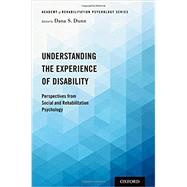Understanding the Experience of Disability Perspectives from Social and Rehabilitation Psychology
, by Dunn, Dana S.- ISBN: 9780190848088 | 0190848081
- Cover: Paperback
- Copyright: 5/31/2019
Rehabilitation psychologists have long argued that situational constraints (e.g., missing ramps, lack of Braille signage, nondisabled peoples' attitudes) create greater social barriers and behavioral restrictions for people with disabilities (PWDs) than do the disabilities themselves. In other words, as social psychologist Kurt Lewin argued, situational factors, including the perceptions and actions of other people, often have greater impact on the experience of disability than do the personal qualities of PWDs themselves. Thus, the experience of disability is shaped by a variety of psychosocial forces and factors, some of which enhance while others hinder daily living. For adequate understanding and to plan constructive interventions, psychological science must attend to how the disabled person and the situation interact with one another. Understanding the Experience of Disability: Perspectives from Social and Rehabilitation Psychology is an edited book containing chapters written by social and rehabilitation psychologists who study how social psychological theory can inform our understanding of the experience of disability and rehabilitation. Chapters are arranged topically into four sections: Established areas of inquiry (e.g., stigma, social biases, stereotyping), mainstream topics (e.g., women, culture and race, aging), emerging issues (e.g., implicit attitudes, family and parenting issues, positive psychology), and issues of injustice, advocacy, and social policy (e.g., perceived injustice, disability advocacy, policy implications). Besides informing advanced undergraduate and graduate students and professional (researchers, practitioners) audiences, the book will help families and caregivers of PWDs, policy makers, and PWDs themselves, understand the social psychological processes linked to disability.







